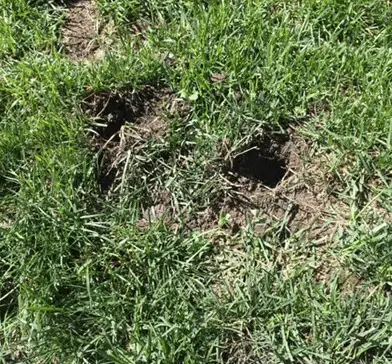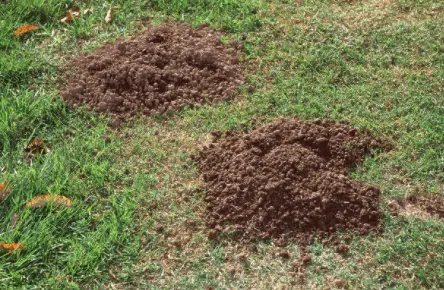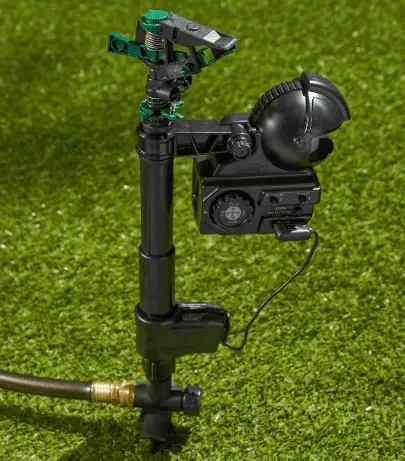A backyard offers an excellent place where you can relax or meet friends. Waking up to a holes in yard can be frightening. From damaging your lawn, shrubs, flowerbed and foundations, holes could also be sheltering dangerous animals such as snakes and scorpions. So, what digs holes in yard overnight?
Animals, insects, rotting roots, kids or pets at play and terrain erosion are main suspects for holes in yard. Thorough investigations of these holes can give a clue of the real cause and ideas on how to prevent.

Holes in Yard Causes
The following are causes of holes in your lawn, garden or the backyard of your home:
Animals
Animals are the main reason for large and small holes in your lawn or garden. They dig holes to store or search for food or shelter. Animals like moles, skunks, and raccoons dig the ground to eat grubs, insects, and worms.
Rotting Roots
Rotting roots of large trees that were cut down some years back can also cause holes to open up in your yard. When the roots decay, they create a space underground where soil can cave in. This usually happens when any small pressure is exerted at the affected areas or whenever the runoff erodes the soil.
Insects
Holes throughout your lawn or garden can be sourced to beneficial insects and earthworms. While these holes may appear unsightly, tunneling earthworm and burrowing of ants and beetles, helps to loosen the soil to allow proper flow of air, water and nutrients to plants.
Kids or pets
kids or pets at play can be suspects for holes in yard. Pets like dogs and cats are usually fond of digging holes for entertainment or in search of insects. Kids similarly dig holes for no reasons as a way of having fun.
What Animals Dig holes in Yard?
Holes in a yard can come in many sizes and shapes including mounds, burrows and divots. By investigating these holes, you’ll be able to get a clear picture of the kind of animal or pest involved. This will be an important step in reclaiming your yard.
Mounds

Holes with a raised soil covering or surrounding their entrance are commonly caused by moles, gophers or crayfish. Investigating further the shape of the hole can narrow to a specific animals.
Moles create conical mounds measuring about 3 to 5 inches in diameter and 2 to 3 foot long below the surface, while gophers form rounded mounds 2 to 3 inches in diameter and 8 to 12 inches deep. If your home is located near water, a hole about 2 inches surrounded by muddy mound signify a crayfish activity.
Burrows
Burrows are shallow holes without a pile of soil around them. They come in various sizes depending on the type of animal in charge. Chipmunks, squirrels rats, shrews and voles create burrows without leaving mounds. To narrow down, chipmunks dig a burrow of about 2 inch wide in walls, structural foundations and areas with dense ground cover.
Ground squirrels dig underground burrows where they rest, sleep and store food. The openings are about 4 inches in diameter, 6 feet deep or 15 to 20 feet long. Rats often dig burrows about 2 to 3 inches in diameter. The holes are commonly located near woodpiles, bushes, trash piles, structures.
Divots
Shallow divots in turf or mulch is an indication of animal activity in search for food. Squirrels, raccoon, skunks and armadillos are the major culprits for divots in your yard. They usually dig the round in search for insects, spiders, worms and grubs. While doing that, they leave plants uprooted and big chunks of sod on the ground.
Some birds will also dig holes in ground to hide food or search for grubs, underground insects and warms. Chicken is usually good at tearing apart flower gardens and lawns either for fun or in search for snacks.
How to stop Animals from Digging Holes in Yard
Animals can make your backyard eyesore, and their frequent visiting will revert all the efforts you have been putting in to have a beautiful garden or landscape. You can safety stop animals from digging holes in yard through the following:

1. Animal Repellents
Using animal safe deterrent products such as pet-safe sprays, motion activated water sprinklers, and ultrasonic sound devices will keep animals away from your yard.
Sprays are formulated with scents or odors that scare away animals such as raccoons, skunks, cats, rats, ducks, bears, deer, dogs, foxes, and many others. The product should be applied according to manufacturer’s instructions.
Motion activated water sprinklers burst a spray of water after detecting an animal from some distance. The sprinkler is strategically placed in a yard to detect and send away pesky animals. This is a safe pet friendly method although comes at a higher budget.
Ultrasonic sound devices are also great for keeping animals from digging holes in garden. They produce a high frequency sound inaudible to humans that scares away animals. They are also motion-activated and they only emit the sound when an animal comes within their range.
No products found.
2. Get Rid of Attracters
Grubs and underground insects are the major attractors of animals in a garden. While they are beneficial to soil, in large amounts they become a threat to your outdoor investments. If you are not comfortable with animals feeding on the grubs, find a pest control product from a gardening store and use according to included instructions.
Keeping away trash bins from your yard, clearing bushy areas and keeping your backyard clean will also help in controlling the number of animals roaming your yard for food and shelter.
Hang birdfeeders high of shrubs or pole to discourage squirrels and other animals from accessing. Further avoid feeding your pets in the yard to prevent food remains that are bound to attract animals.
3. Physical Barriers
Physical barriers such as fencing with chicken wire, installing prickly mats, adding rough materials such as stone mulch or plastic runner on the soft ground will typically discourage animal activity.
4. Spray Vinegar
The smell of vinegar is good at keeping most animals away from your yard including rodents and cats. You can also use vinegar to keep away snakes and other animals that may settle in the existing holes and cracks in your yard.
5. Clear the Mess
Filling the holes in your backyard and repairing damaged structures will discourage animals from making more holes or vising your garden. Use soil to cover the holes, add some compost manure, plant affected shrubs, grass or flowers and water them to establish faster.
6. Contact authorities
Contact any nearby animal control agencies who may offer a lasting solution to the problem of animals in your yard. They will use safe products or traps to capture and relocate the animals safely. Animals such as stray cats and dog will be taken to recue centers.
Conclusion
While holes in yard is typically a worrying situation, always use safe methods to keep away animals that dig holes in your backyard. Using a harmful product on animals is inhumane and against the law. It could also be a danger to pets and kids. Be careful when dealing with holes in yard, some may be sheltering dangerous animals such as snakes, scorpions and venomous spiders.